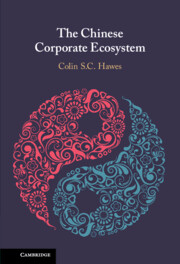Book contents
- The Chinese Corporate Ecosystem
- The Chinese Corporate Ecosystem
- Copyright page
- Contents
- Figures
- Acknowledgments
- Introduction
- Part I Different Types of Chinese Corporate Ecosystem
- Part II Forces Acting on the Corporate Ecosystem
- 4 The Communist Party and Corporations
- 5 Corruption and Anti-corruption
- 6 Guanxi
- 7 Legal Contradictions in the Corporate-Political Ecosystem
- Part III Impacts on the Natural/Human Ecosystem
- Notes
- Index
7 - Legal Contradictions in the Corporate-Political Ecosystem
from Part II - Forces Acting on the Corporate Ecosystem
Published online by Cambridge University Press: 21 July 2022
- The Chinese Corporate Ecosystem
- The Chinese Corporate Ecosystem
- Copyright page
- Contents
- Figures
- Acknowledgments
- Introduction
- Part I Different Types of Chinese Corporate Ecosystem
- Part II Forces Acting on the Corporate Ecosystem
- 4 The Communist Party and Corporations
- 5 Corruption and Anti-corruption
- 6 Guanxi
- 7 Legal Contradictions in the Corporate-Political Ecosystem
- Part III Impacts on the Natural/Human Ecosystem
- Notes
- Index
Summary
This chapter shows how the Chinese commercial legal system has improved significantly over the past two decades, to the extent that in most cases it compares favorably in dispute resolutions outcomes with legal systems in most liberal democratic nations. However, it falls short of a "rule of law" system in certain types of cases due to three distortions interfering with decision-making by courts: political interference by local and sometimes central government officials; corruption; and guanxi (personal relationships) involving judges or senior court/government officials. The chapter uses the case of Judge Wang Linqing and the Shaanxi Billion Yuan Mining Rights dispute to demonstrate that these distorting elements have infected legal institutions right up to the Supreme People's Court and involve senior Chinese Communist Part leaders within China's anti-corruption agency and Politburo, making the problems very difficult to stamp out.
- Type
- Chapter
- Information
- The Chinese Corporate Ecosystem , pp. 200 - 230Publisher: Cambridge University PressPrint publication year: 2022

